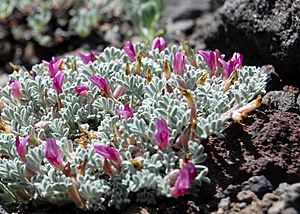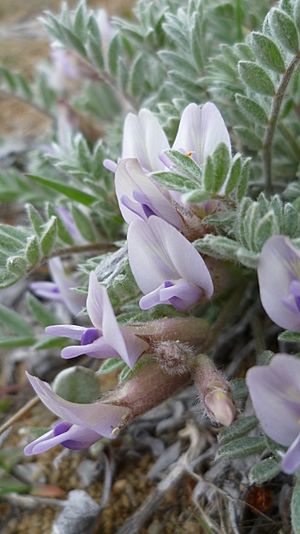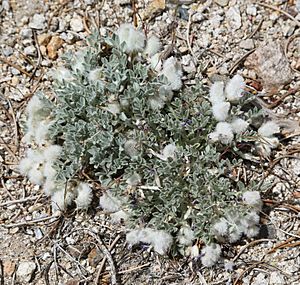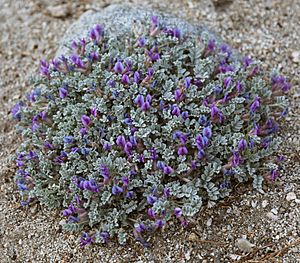Woollypod milkvetch facts for kids
Quick facts for kids Woollypod milkvetch |
|
|---|---|
 |
|
| Astragalus purshii var. tinctus. On the Thunder Mountain trail, in the Sierra Nevada, Amador County, El Dorado National Forest, California. US Forest Service photo. | |
| Scientific classification |
|
| Kingdom: | Plantae |
| Clade: | Tracheophytes |
| Clade: | Angiosperms |
| Clade: | Eudicots |
| Clade: | Rosids |
| Order: | Fabales |
| Family: | Fabaceae |
| Genus: | Astragalus |
| Species: |
A. purshii
|
| Binomial name | |
| Astragalus purshii |
|
| Script error: The function "autoWithCaption" does not exist. | |
Script error: No such module "Check for conflicting parameters".
Astragalus purshii, also known as the woollypod milkvetch or Pursh's milkvetch, is a cool type of plant called a milkvetch. It's known for its fuzzy, woolly look!
Contents
Where Does It Grow?
This plant grows naturally across a large part of western North America. You can find it in southwestern Canada, the northwestern United States, Nevada, and all over California.
It lives in many different places, from high mountains to dry deserts. You might see it along the Columbia River in dry, shrubby areas. It often grows in rocky soils that have been disturbed, like after a landslide.
What Does It Look Like?
Astragalus purshii is a small plant that lives for many years. It forms low, flat mats on the ground. It usually grows less than 5 centimeters (about 2 inches) tall, but can reach up to 14 centimeters (about 5.5 inches).
Its leaves can be up to 15 centimeters (about 6 inches) long. Each leaf has many small, oval or round leaflets. The stems and leaves are covered in soft, white, woolly hairs. This makes the whole plant look silvery!
The plant's flowers grow in a cluster, with 1 to 11 flowers together. Each flower is between 1 and 3 centimeters long. Their colors can be pink, rose, purple, or white, depending on where the plant is growing.
After the flowers, the plant makes a fruit called a legume pod. These pods can be up to 3 centimeters long. They are covered in thick, white, woolly hairs. They look a lot like a small rabbit's foot or a cotton ball!
Different Kinds of Astragalus purshii
There are many different types, or varieties, of Astragalus purshii. Here are some of them:
- A. p. var. concinnus — found in Idaho and Montana.
- A. p. var. glareosus — grows from British Columbia to Utah.
- A. p. var. lagopinus — found only in the Modoc Plateau area of California.
- A. p. var. lectulus — grows in California and Nevada.
- A. p. var. ophiogenes (Snake River milkvetch) — found in Oregon and Idaho.
- A. p. var. pumilio — found only in Nevada.
- A. p. var. purshii — this variety is found almost everywhere the species grows.
- A. p. var. tinctus — grows across the western United States.
Growing This Plant
Astragalus purshii is sometimes grown in gardens because it's a beautiful ornamental plant. It's great for rock gardens because it stays small and loves rocky places.
It's also used in projects to make landscapes more eco-friendly. People use it to help restore natural areas that have been damaged. It's also good for fixing up land that needs new plants.
The seeds of this plant don't need special treatment to grow. They can handle low rainfall and dry conditions, which means they don't need a lot of water. This makes them a good choice for gardens where people want to save water. These plants are also very tough and can survive cold temperatures down to -33 degrees Fahrenheit.
 | Claudette Colvin |
 | Myrlie Evers-Williams |
 | Alberta Odell Jones |




